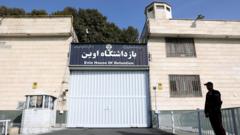As President Donald Trump ordered military strikes on Iranian nuclear facilities, questions arose regarding the legal authority underpinning his decision. Democrats and some Republicans voiced concerns, citing the constitutional distribution of war powers between Congress and the presidency.
Trump's Authority for Striking Iran: A Legal Examination

Trump's Authority for Striking Iran: A Legal Examination
Recent airstrikes on Iran prompt constitutional debates among lawmakers.
The constitutional framework involves both Article I, which vests Congress with the authority to declare war, and Article II, which designates the president as Commander-in-Chief of the armed forces. Trump's strikes, which the administration justified as a response to imminent threats, reignited discussions among constitutional experts regarding the appropriate limits of executive military action.
Constitutional scholars are divided on the legitimacy of Trump's actions. Some argue that Article II provides the president with sufficient authority to engage in military operations without congressional approval under specific conditions, such as anticipated attacks or safeguarding national interests like preventing nuclear proliferation. Despite this viewpoint, critics contend that the absence of an immediate threat to the U.S. undermined Trump's legal justification.
Historical precedents reveal a trend of presidents taking military action without prior congressional consent. Instances include Barack Obama’s intervention in Libya and Donald Trump's previous order for the assassination of Iranian Qasem Soleimani. The legal landscape surrounding such executive actions has evolved, leading to greater acquiescence from Congress over time, according to legal experts.
The War Powers Resolution of 1973 aimed to restrict presidential military engagement without congressional consultation. However, it allows for emergency military action, with the requirement for the president to seek congressional input, typically fulfilled post-action. Reports indicate that Trump’s administration may not have adhered to these stipulations, raising further scrutiny.
As legal interpretations vary, the implications of these military actions continue to stir debate, highlighting the complexities of war powers in contemporary governance.
What are your thoughts on the legality of military strikes without congressional approval? Join the discussion.
Constitutional scholars are divided on the legitimacy of Trump's actions. Some argue that Article II provides the president with sufficient authority to engage in military operations without congressional approval under specific conditions, such as anticipated attacks or safeguarding national interests like preventing nuclear proliferation. Despite this viewpoint, critics contend that the absence of an immediate threat to the U.S. undermined Trump's legal justification.
Historical precedents reveal a trend of presidents taking military action without prior congressional consent. Instances include Barack Obama’s intervention in Libya and Donald Trump's previous order for the assassination of Iranian Qasem Soleimani. The legal landscape surrounding such executive actions has evolved, leading to greater acquiescence from Congress over time, according to legal experts.
The War Powers Resolution of 1973 aimed to restrict presidential military engagement without congressional consultation. However, it allows for emergency military action, with the requirement for the president to seek congressional input, typically fulfilled post-action. Reports indicate that Trump’s administration may not have adhered to these stipulations, raising further scrutiny.
As legal interpretations vary, the implications of these military actions continue to stir debate, highlighting the complexities of war powers in contemporary governance.
What are your thoughts on the legality of military strikes without congressional approval? Join the discussion.





















